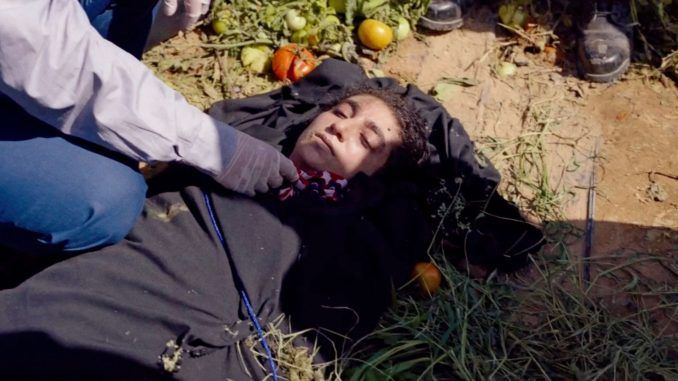
Rating: C+
Dir: Ali Abbasi
Star: Zar Amir-Ebrahimi, Mehdi Bajestani, Arash Ashtiani, Forouzan Jamshidnejad
On our countries page, I’m christening the Iran category, rather than filing this under any of the United Nations listed on its IMDb page: Denmark, Germany, France, Sweden, Jordan and Italy. For I suspect the film would have existed without all of them. It is, however, very pointedly about Iran, and in particular the many ways it mistreats women. [I recommend this movie to anyone who posts “America is literally The Handmaid’s Tale” memes on social media…] It’s based on the true story of serial killer Saeed Hanaei, who killed 16 prostitutes over the course of about a year, in Iran’s second city of Mashhad. While eventually caught and executed, he claimed to be on a divine mission.
In a number of respects, this reminded me of the Yorkshire Ripper, Peter Sutcliffe, who also claimed he was told to kill by the voice of God. Both men not only targeted sex workers, they were married, to women who were blithely unaware of their spouses’ extramarital activities. Here, though, Hanaei actually carried out the murders in the family house, while his wife and children were out, which is truly Expert difficulty level serial killing. I’m not sure whether I’m more impressed with him disposing of corpses on his motorbike, or his wife failing to notice the high turnover of rugs. Anyway, there were similar accusations levelled at the authorities, for taking so long to catch each killer, though in Yorkshire, this seems mostly laziness and incompetence. The film here strongly suggests the Iranian police didn’t object to Hanaie’s choice of victims, regarding the prostitutes as less human – in line with the religion-inspired attitude towards women in general.
 This is illustrated through the stories of fictional journalist Arezoo Rahimi (Amir-Ebrahimi) and technically fictional serial killer Saeed Azimi (Bajestani) – his surname is different, a change that’s really not fooling anyone. She travels from Teheran to Mashad to write about the killings he has been committing in the name of Allah. Barely has she arrived when she’s encountering resistance from the patriarchy, simply for having the temerity to book a hotel room for herself. This sets the tone, with just about every man she encounters treating her with disdain on down. Even her generally sympathetic colleague, Sharifi (Ashtiani), inquires callously about a situation at her previous job, where Arezoo experienced sexual harassment, which ended with her being the one fired.
This is illustrated through the stories of fictional journalist Arezoo Rahimi (Amir-Ebrahimi) and technically fictional serial killer Saeed Azimi (Bajestani) – his surname is different, a change that’s really not fooling anyone. She travels from Teheran to Mashad to write about the killings he has been committing in the name of Allah. Barely has she arrived when she’s encountering resistance from the patriarchy, simply for having the temerity to book a hotel room for herself. This sets the tone, with just about every man she encounters treating her with disdain on down. Even her generally sympathetic colleague, Sharifi (Ashtiani), inquires callously about a situation at her previous job, where Arezoo experienced sexual harassment, which ended with her being the one fired.
None of the resistance stops her investigation: indeed, it seems to increase her commitment to the point of recklessness. Chris sardonically commented, “It’s like Saeed wants to get caught, and Arezoo wants to get killed. Both deserve what happens to them,” and she’s not exactly wrong. A bigger hurdle was the facile ease with which Arezoo dresses up as one of the local hookers, and the killer naturally picks her up within what feels like five minutes. She then manages to do something none of his previous victims managed: escape the clutches of this ex-soldier, who outweighs her by a good hundred pounds. It’s simply bad writing, and too many elements of the script feel ridiculously implausible and/or obvious.
It’s fortunate these weaker elements occupy only the first half – I was surprised how little – and most of the other aspects work better. In particular, the performances of both leads are convincing, even though Amir-Ebrahimi was initially the movie’s casting director, not its star. Bajestani is particularly good, almost scarily so when making pronouncements about his cause and commitment to it. The ambivalence (at best) of Iranian society is well-depicted, Saeed becoming an almost cult hero to many for his one-man crusade against moral decadence. It’s hard to feel superior though, given the stalwart defenses of violent, vigilante action I increasingly see in Western society, courtesy largely of media-driven divisions. This works best as a pointed parable about what can happen when a society allows ideology to replace morality.
